 La Plata
La PlataDental
 La Plata
La Plata
Emergencies of any kind are painful, stressful, and scary by their very definitions, but a dental emergency can cause even greater anxiety. Many people aren’t sure what to do when a dental emergency strikes. Do you go to an emergency room or call for an ambulance? At La Plata Dental, we are always here to help whenever our patients need us. That includes emergencies! We are able to provide same day appointments in most cases, and one of our knowledgeable team members will walk you through at-home care over the phone. Contact us right away if you experience a dental emergency.
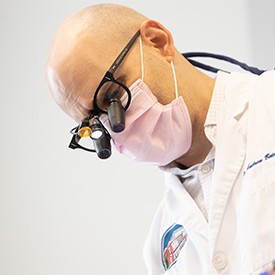
In the case of a dental emergency in La Plata, the first step you should always take is to call our office to schedule an appointment for as soon as possible. Depending on the time you call, we’ll likely be able to fit you into our schedule the same day, ensuring that you won’t have to sit in pain for any longer than necessary.
Once you arrive, our team will assess the damage to your smile and ask you about your symptoms. If necessary, we may take digital X-rays or a scan of your facial structure with our cone beam CT scanner. These diagnostic images will provide us with greater insight into any underlying causes for your discomfort. After our examination, Dr. Hochman or Dr. Betaharon will discuss their findings with you as well as their treatment recommendations. After any questions you have are answered and you consent to moving forward with treatment, our team will start restoring your smile!
Any time you believe the dental pain or damage you’re experiencing requires immediate attention, you’re probably correct. To get an idea of what we mean, you can review the following list of common emergencies we see:
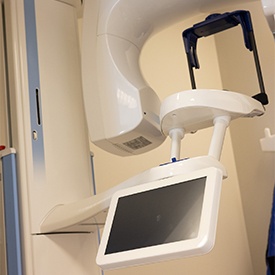
When you have tooth pain, it can be difficult to describe it to a dentist. This is especially the case if this is the first time you’ve ever experienced dental discomfort. We want to do everything possible to pinpoint the exact location of your pain, treat the problem, and have you leaving the office with relief. One of the ways we do this is by capturing 3D images of your mouth with our in-house cone beam CT scanner. Diagnosing dental discomfort starts with gathering as much information as possible, and the CBCT scanner plays a major role in that process.
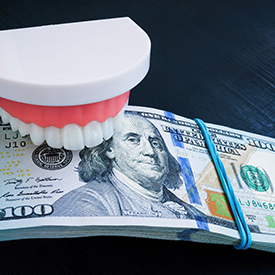
Although our team won’t be able to provide you with a detailed cost estimate until after we’ve had a chance to examine your smile and diagnose any issues that need to be addressed, we can provide you with information on the factors we need to consider and whether or not dental insurance covers emergency dental care. So, don’t hesitate to read on to learn more about the topic. You can also give us a call to schedule your exam. Rest assured, we value transparency and honesty and provide our patients with trustworthy service.
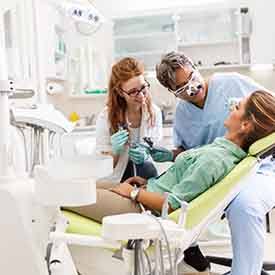
No two dental emergencies are the same because no two patients are identical! As a result, each treatment plan is slightly different. Plus, even if two patients came to our office because of persistent dental sensitivity, that doesn’t necessarily mean they need the same treatment. One might need a tooth-colored filling to address tooth decay, and the other might need a dental crown to protect a cracked tooth moving forward. The good news is that we can share all of your treatment options and provide you with an estimate of the cost following your emergency exam, ensuring you aren’t caught off-guard when it comes time to pay.
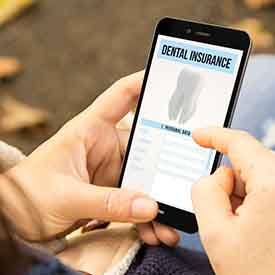
Usually, dental insurance providers cover a portion of the cost. For example, your plan might include one emergency exam annually. It might also include 50% to 80% of the cost of essential restorative care, including dental crowns and root canal treatment. Since we’re in-network with several dental insurance plans, you can count on us to help you navigate the ins and outs of your coverage. We’ll do our very best to maximize your savings and make the process of utilizing your available benefits a breeze.
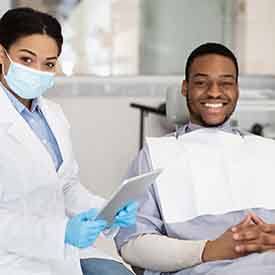
If you don’t have dental insurance at the moment, that’s okay – that’s just one of the financial solutions we offer. We also welcome CareCredit flexible financing so that you don’t have to pay for the entire cost of your emergency dental care in one lump sum. Instead, you can choose a payment plan that works with your budget and breaks down the payments into smaller, monthly installments. If you’d like more information on flexible financing, you’re more than welcome to give us a call or ask us for further details at your appointment.

Remember, many dental emergencies can be avoided with the right habits in place. A few examples include brushing and flossing consistently, getting a dental checkup and teeth cleaning twice a year, and wearing a mouthguard during contact and non-contact sports alike. These may seem small, but they can make a big difference when it comes to the health of your smile and wallet!
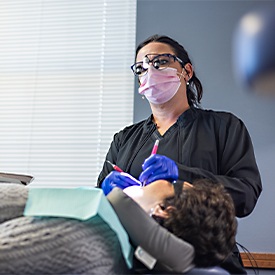
There’s no trick to preventing dental emergencies other than simply being mindful! By practicing the following preventive tips, you may be able to keep yourself from requiring emergency dental care:
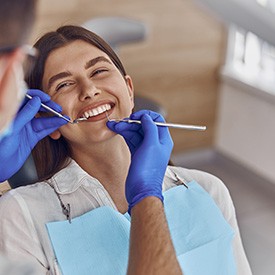
Although no two smiles are exactly the same, every patient benefits from coming to our office twice a year for a dental checkup and teeth cleaning. Why? To start, these routine appointments ensure that dental damage, tooth decay, oral cancer, and gum disease are caught early on and while they are still treatable. Furthermore, built-up plaque and tartar cannot be removed at home; the special tools we have at our office are the only ones that can clear away harmful substances like these.
Note: If you start to notice abnormal dental symptoms before your next appointment – whether it’s pain when biting down or bleeding gums – contact us ASAP so we can determine what the root of the problem is.

Another important component of maintaining a healthy, happy smile is committing to a solid oral hygiene regimen at home. There are three main components to this: brushing twice a day, flossing each morning or evening, and rinsing with mouthwash consistently. The tools and techniques you use are also important, so don’t hesitate to get in touch with us if you have any questions about either.

If your diet is loaded with added sugar, tooth decay is pretty much inevitable. That’s why we recommend sticking to a well-balanced diet that’s filled with nutrient-dense foods instead! It’s also important to exercise caution with extremely crunchy foods, like hard pretzels, since they can lead to a chip or crack. You should also avoid chewing on non-food items, like ice cubes and pen caps.
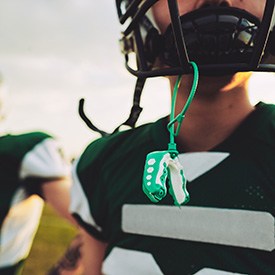
If you participate in sports or a physical activity like weightlifting, then you should wear a protective mouthguard. That way, your teeth and gums are protected from impact, clenching, and the like. We recommend having a custom mouthguard made so that it fits properly too (unlike the ones at local sporting goods stores that are one-size-fits-all).

Do you have a habit of biting your nails when you’re nervous? Maybe you smoke, chew on ice cubes, bite on the back of your pencil, or use your teeth to open packaging. These are all habits that can lead to a serious dental injury, so it’s important that you quit! We know that’s sometimes easier said than done, which is why we recommend asking your primary care physician or our team for help.
A toothache may subside on its own, but it's usually a sign that something is wrong, such as tooth decay, gum disease, or an infection. Sometimes, the pain might temporarily lessen if the nerve tissue inside the tooth dies completely. However, this doesn't mean the problem is resolved; it’s actually gotten worse. Ignoring a toothache can lead to more severe issues like abscesses, which are serious infections. It's best to talk to us so we can diagnose and treat the cause rather than hoping the pain will go away on its own.
Yes, an emergency room (ER) can remove a tooth, but it’s typically not their primary function. ER doctors are trained to handle a wide range of medical emergencies, and while they can perform a tooth extraction in cases of severe infection, trauma, or uncontrollable pain, they usually prefer to stabilize the patient and then refer them to a dentist or oral surgeon for definitive care.
It's worth noting that ERs typically lack the specialized dental equipment and expertise that a dentist would have. Therefore, if the situation allows, seeking care from a dental professional is usually the better option for both the procedure and follow-up care.
For a small chip in your tooth, it's generally a good idea to visit a dentist, even if the chip seems minor and isn't causing pain. While small chips might not seem serious, they can lead to other issues if left untreated. The rough edges of the chipped tooth can irritate your tongue or cheek, and the exposed area might be more susceptible to decay or further damage over time.
We can evaluate the chip and determine the best course of action. In many cases, a minor chip can be smoothed out or repaired with bonding, a procedure where a tooth-colored resin is applied to restore the tooth’s shape and appearance. If the chip is very small, we might just polish the area to remove any rough edges.
No, you should not put a knocked-out tooth in water. If a tooth gets knocked out, the best chance of saving it is to keep the cells on the root alive until it can be reinserted. Water is not ideal for preserving these cells because it can cause them to swell and burst, reducing the chances of successful reimplantation.
Instead, you should try to place the tooth back in its socket as soon as possible. If that's not feasible, the next best option is to keep the tooth moist by placing it in milk or a saline solution. Milk is particularly effective because it helps maintain the balance of proteins and sugars that are essential for the cells' survival. If neither milk nor saline is available, you can hold the tooth in your mouth between your cheek and gums, but be careful not to swallow it.
It's crucial to handle the tooth by the crown (the part that’s normally visible in the mouth) and avoid touching the root. Seeking immediate dental care is essential, as the chances of successfully reimplanting the tooth are highest within the first hour after the injury.
Preventive Dentistry Restorative Dentistry Dental Implants Cosmetic Dentistry Periodontal Therapy Sedation Dentistry Advanced Technology View Our Services